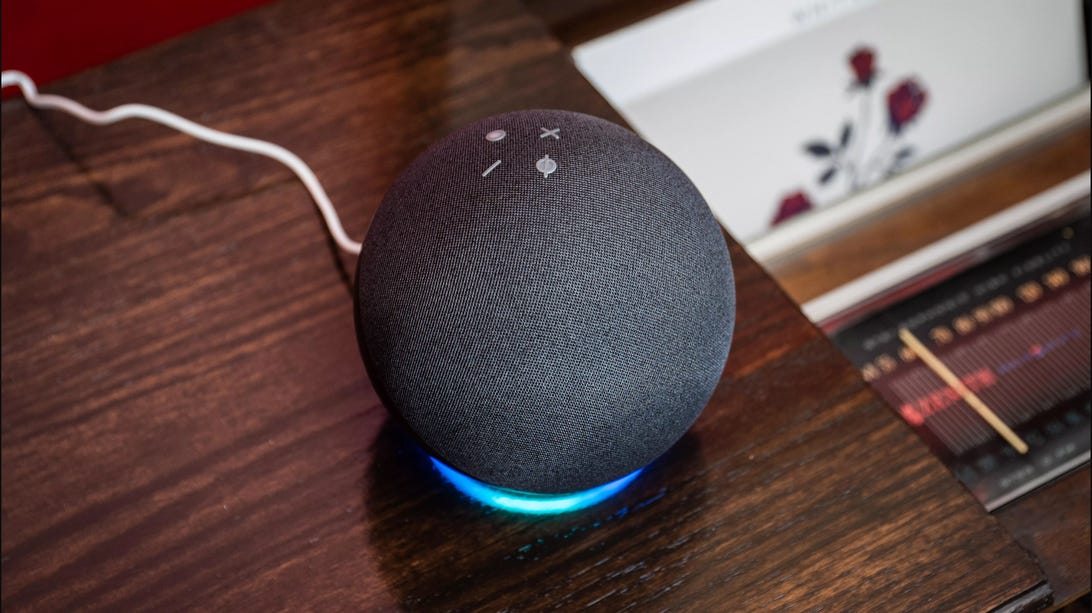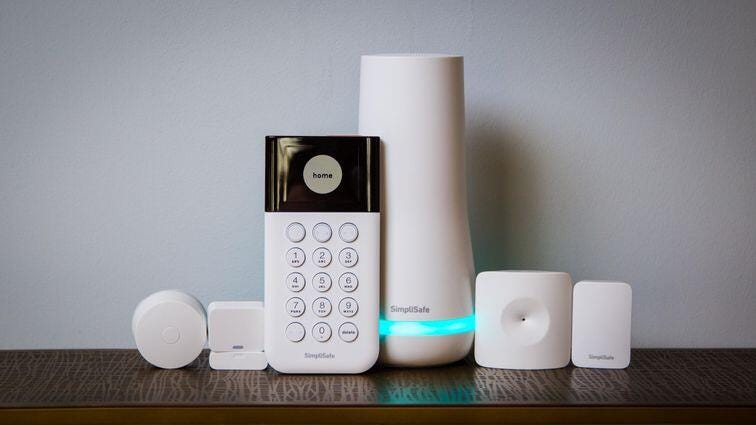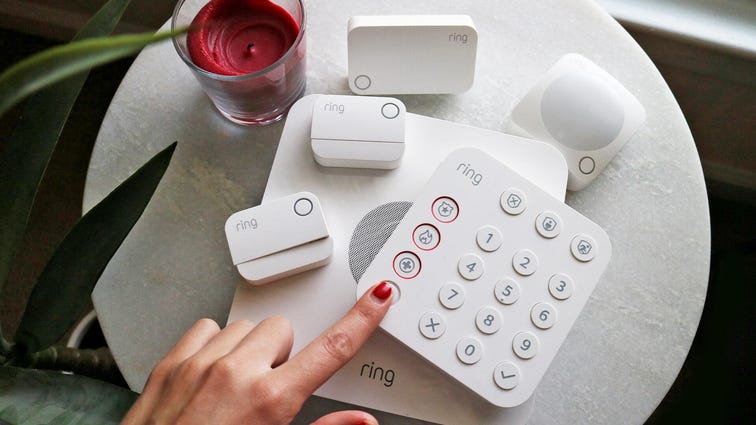Over the past 15 years, the home security industry has been shaken up as traditional, professionally installed systems like ADT and Comcast Xfinity -- which have been around for decades in some cases -- have been forced to make room for brash new competitors. Affordable and accessible DIY systems and standalone internet-connected devices like smart locks, cameras and video doorbells have captured consumers' attention and all elbowed their way into the space.
It's not just dedicated home security developers muscling into the industry, either. Tech giants like Google, Apple and Amazon have acquired smaller security-focused companies and launched their own gadgets for years now. The typical DIY system these days goes way beyond a security camera with a motion sensor that sends alerts to a monitoring service. Now, you can add whatever sort of security equipment it takes for you to feel safe, from a door sensor and door lock with cellular backup to a smoke detector -- and have them all managed via a central base station or control panel.

Meanwhile, new technologies often mean new vulnerabilities, whether it's the risk of hacking that accompanies the proliferation of Wi-Fi connected security cameras in homes or the rise in package theft that has accompanied Amazon delivery's explosive growth.
It's admittedly quite a bit to take in -- and today's home security providers don't necessarily always make it easy to comparison shop.
That's where we come in. We've put the top DIY security systems to the test at the CNET Smart Home, and we keep up to date on the latest standalone device releases from major companies like Ring and Arlo. We look at other important factors, too -- including the privacy concerns that come with filling your house with cloud-connected cameras.
In 2021, we aim to bring that same thorough coverage to professionally installed and monitored security systems like Vivint, ADT, Comcast Xfinity and more. While we've tested some of these systems in the past, technology is changing quickly, and the best advice requires updated, hands-on experience with the products. Keep this page bookmarked and check back as we expand it throughout the year to include a deep dive into all the best security systems to protect your home in 2021.
The best DIY security systems
SimpliSafe's easy-to-install, easy-to-use DIY home security system is well-positioned as the best home security system when it comes to value. It offers a comprehensive set of features, security cameras and a very good mix of battery-powered sensors, all of which performed reliably well in our tests. Starter kits begin at about $200, or you can build your own custom alarm system with the exact mix of devices you're interested in.
A professional monitoring plan starts at $15 per month, but you'll almost certainly want to spring for the $25-per-month plan, which adds in things like mobile app controls and voice support via Alexa and the Google Assistant. That also means that you should go with another pick like Abode or Ring if you don't want professional monitoring via a monitoring station but still want to control your system from a smartphone app.
Our top SimpliSafe alternative, Abode is a well-thought-out security system that supports both Zigbee and Z-Wave. Further, it works with Alexa, Google Assistant, IFTTT, Nest and plenty of other smart home brands. The real point of appeal, though, is that Abode offers lots of flexibility with regard to professional monitoring -- including the option of only paying for temporary monitoring during the times when you're actually out of town, no long-term contract required.
While Abode is pricier up-front than Simplisafe (its most basic kits start at $200), it's a well-designed system that will play nicely with many existing smart home setups.
Editor's note, March 26, 2021: Ring has been called out for its partnership with local police departments in the US, leading privacy advocates to express concern about the data Ring shares with law enforcement and how they use that information. In December 2019, thousands of Ring users' personal information was exposed, leading us to stop recommending Ring products. Ring has since updated its security policies, from offering customers a Control Center dashboard allowing people to more easily access privacy and security settings to requiring two-factor authentication.
We have resumed recommending Ring's products with this caveat: If you have concerns about Ring's privacy policies, make sure to familiarize yourself with its privacy statement. You can read more about how we factor Ring's privacy policies into our recommendations here. CNET has not and will not be issuing Editors' Choice awards to Ring while the company's policies around law enforcement and surveillance remain on their current course.
A subsidiary of Amazon, the Ring Alarm security kit is quick to install and easy to use. Besides integrating with some other smart home devices, there's nothing all that innovative about it -- though Amazon Alexa users will appreciate the two-way voice feature, that they can arm and disarm the system using voice commands, and that they can use Ring's sensors to trigger Amazon Alexa routines.
With a buy-in cost of $199 and professional monitoring available for just $10 per month, Ring Alarm stands out as a value pick -- and despite some privacy concerns about Ring's failure to protect user data and its controversial collaboration with police organizations, the brand appears to be making strides toward more transparency, better security and more privacy-minded features of late.
What about Google?
Google Nest's erstwhile security system
Nest Secure

Why DIY might not be right for you
While DIY systems offer some of the best values for security systems -- in particular because they rarely include contracts of any kind -- they can entail more up-front fees to buy the devices you'll use and more work than some customers are ready to take on, especially for installation in larger homes.
What about the mainstays of home security -- security monitoring company names like ADT and Brinks that you've probably been familiar with for years, along with home security systems offered by major telecom providers like Comcast and AT&T?
The pitch is pretty similar across the board: In addition to basics like motion sensors, window sensors and door sensors, these kinds of professional installations will also promise to cut back on false alarms to the monitoring center and seamlessly integrate things like door locks, cameras, keypads, thermostats, carbon monoxide detectors and touchscreens. They'll often support voice controls via Amazon Alexa and the Google Assistant, too. Most charge an upfront equipment or installation fee and some require multiyear service contracts. As for the monthly fee for professional monitoring, those are mandatory and will typically range from $30 to $50 per month.
That said, the DIY insurgents are forcing traditional systems to change a little bit: services like Vivint and Comcast Xfinity no longer require contracts for customers who pay higher up-front service fees, and companies like ADT are introducing third-party device integration to their lineup of proprietary cameras and sensors.
While we've tested some of these companies in the past, we're clearing the slate for 2021, withholding a formal recommendation until we've tested the systems in their current forms. For now, though, here is the information we're able to get on each.
The professionally installed and monitored options
Comcast Xfinity Home

It isn't available in all regions (check for local availability), but Comcast Xfinity Home left us impressed when CNET Senior Editor Josh Goldman tested the system out at his home in northern New Jersey back in 2017.
Xfinity's various security options include introductory fees (with the option of two-year payment plans and contracts) ranging from $360 to $600, and they come with professional monitoring for an additional base of $30 per month.
These packages include devices like touchscreen controllers, door and window sensors, motion sensors, keypads, cameras and backup cellular systems.
Vivint Smart Home

Vivint was a solid security system that worked well when we tested it out in 2018, but the equipment has largely changed in the past three years.
Vivint includes a $100 installation fee and a base $30 professional monitoring fee, and like Xfinity can be contract-free if customers pay for their hardware up-front. That hardware is where Vivint can get a little pricey, with devices like their $150 Doorbell Camera and $400 Outdoor Camera Pro (that price includes installation).
AT&T Digital Life

We liked this sleek security system when we tested it back in 2015, but it appears the system is no longer being installed for new customers.
AT&T Digital Life notwithstanding, high-end systems like these will sometimes make it tough to comparison shop between companies. For instance, head to home security company ADT's website and you'll find plenty of marketing copy touting the value of the security company's various home security offerings and customer service -- but you won't find much by way of pricing specifics.
Here are the other companies we've reached out to, none of which has yet responded with pricing information. If and when they respond, we will update this portion of the article:
ADT

When I called ADT's customer line, the attendant told me I had to provide my precise address to receive any pricing information. An ADT spokesperson, however, provided more information. ADT's professionally monitored systems vary in their up-front fees, but they all require contracts (24 months in California, 36 months everywhere else). These contracts require monthly monitoring fees starting at $29 ($43 for home automation options).
Customers may purchase their hardware up-front, or finance it over 60 months, if they are approved for such an offer.
Brinks Home

Brinks Home used to have more information available on its website, but full information on its up-front pricing, contract requirements and monthly monitoring fees are no longer easy to find online. Brinks representatives have not responded to requests for this information from CNET, but I will add that information if and when the company provides it.
Video doorbells and standalone cameras
If you don't need an entire security system, and instead just want to keep an eye on activity at your front door, then you might consider installing a video doorbell or standalone security camera to keep watch.
Read more: The best video doorbells of 2021
You've got lots of options right now, and thanks to automation, all will send real-time alerts via a Wi-Fi connection or cellular connection to your cell phone or smart device whenever someone rings to show you who's at the door. Some also track for unexpected motion or allow for two-way audio -- and we're seeing lots of new options that are capable of recognizing faces, too. That includes our top pick:
Arlo's $150 Video Doorbell cam is easy to install, performs well and has competitive features and cloud storage fees, starting at $3 a month. With a cloud storage subscription, you get access to advanced functionality like custom person, animal, vehicle and package alerts.
The Arlo Video Doorbell, our pick for best video doorbell overall, also features a built-in siren, two-way audio, motion detection zones and arm/disarm modes.
Nest's stylish video doorbell is a smart, sleek pick that aced our tests. Features like person detection and geofencing are helpful and easy to use, and you can also upgrade to the Nest Aware cloud subscription service to enable facial recognition and access to saved recordings.
It's obviously best for households that have already committed to Google and Nest's smart home ecosystem, but Nest's doorbell also works with both Alexa and IFTTT, which helps make it a very solid choice for just about anyone.
The $20 Wyze Cam isn't just a great budget surveillance camera, it's a great camera. Period.
Between HD live streaming, motion alerts, night vision, a decent app and, best of all, 14 days of free motion-based cloud storage, this Wyze camera will meet all your needs at an incredibly wallet-friendly price. It also features a built-in microSD card slot if you want local video storage rather than relying solely on its cloud service (you have to buy the microSD card separately).
In addition, it works with Alexa and Google Assistant voice commands, too, and features a motion detection zone and the ability to listen for and alert you to special frequencies, like smoke alarms.
Prices for doorbells typically range from about $100 to $250, and cameras are now regularly dropping below $100, as Wyze makes evident. Most also charge an optional fee for viewing saved video clips. To pick a doorbell cam, first figure out if your front door has a hardwired doorbell connection or if you'll need something battery-powered. Then, consider features -- for instance, do you keep a porch light on at night, or will you need something with night vision?
From there, think about which smart home platforms you want your doorbell to work with. On that front, you'll find lots of options that work with Alexa and plenty that work with IFTTT, and with Google and Nest, too.
Many of the major home security systems now offer video doorbells and cameras of their own, and some offer compatibility with standalone video doorbells and keypads like these, too. Keep that in mind if you think you might want to expand to a full system later on down the line.
Other security devices
Lots of us use motion-activated lights on our porch or outside our garage door -- and though there's plenty of debate as to whether or not exterior lighting can actually help deter a burglary, most experts agree that it can help play a role when used correctly. If you're thinking about upgrading to something a little smarter than that cheap porch light, you've got a couple of options worth considering.
Philips Hue Outdoor Sensor

For the most part, I think that Philips Hue's outdoor lights are overpriced and really only worth it if you're willing to splurge. That said, I really liked the Philips Hue Outdoor Sensor, which you can get for less than $50. Stick the wireless system up anywhere you like outside, and it'll track motion, temperature and ambient light conditions. You can use that info to trigger your Hue lights, and also to trigger any Apple HomeKit gadgets under your roof.
I wish that the Hue team offered a better variety of practical outdoor lights that don't break the bank, as well as lights with motion detection sensors of their own -- but if you've already bought in, or if you're using Apple HomeKit-compatible lights, then the Hue Outdoor Sensor is definitely worth a look.
Alexa Guard

If you use Alexa to control the smart lights in your home, then you should consider trying out Alexa Guard, a home security mode with a couple of neat tricks. After turning Guard Mode on in the Alexa app's settings, just say, "Alexa, I'm leaving" as you walk out the door to activate it. From there, Alexa will cycle your lights on and off to make it look like you're home -- and you'll also get a notification if your Echo speakers hear the sound of an alarm or broken glass.
The recently launched Guard Plus, a subscription upgrade with extra features like a helpline, has added even more options for $5 per month.
More home automation recommendations
from CNET https://ift.tt/3xrRvCQ
via IFTTT









No comments:
Post a Comment